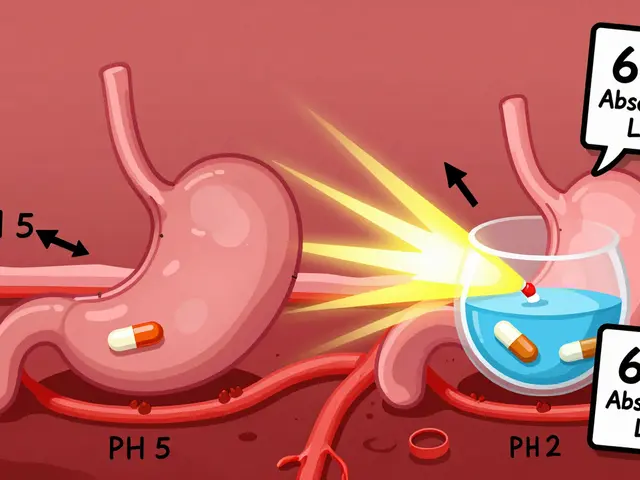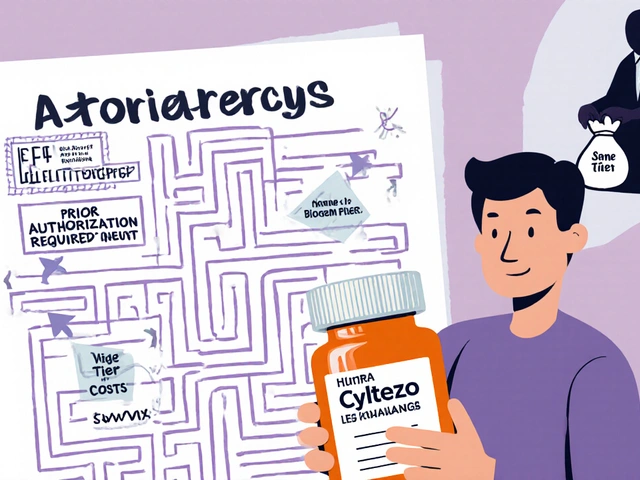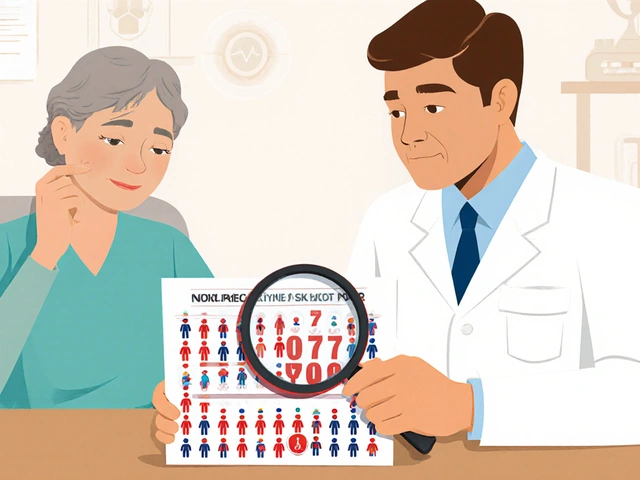HIV Treatment Recommendation Tool
Get personalized treatment recommendations
This tool helps you understand which HIV treatment options might work best for you based on your specific health situation and lifestyle. Answer the questions below to see which options are most suitable.
Your Health Profile
Your Lifestyle Preferences
Your situation: Your answers indicate that
Recommended Options
Important note
These recommendations are based on general information from the article and your responses. Always consult with your healthcare provider to determine the best treatment for your specific situation.
Choosing the right HIV medication isn’t about picking the most popular name. It’s about finding what works for your body, your lifestyle, and your long-term health. Biktarvy has become one of the most prescribed HIV pills in the U.S. and Europe, but it’s not the only option. If you’re on Biktarvy and wondering if there’s something better-or if you’re just starting treatment and comparing pills-you need to know what else is out there in 2025.
What Biktarvy Actually Contains
Biktarvy is a single-pill, once-daily treatment that combines three drugs: bictegravir, an integrase inhibitor that blocks HIV from inserting its DNA into human cells, emtricitabine, a nucleoside reverse transcriptase inhibitor that stops the virus from copying itself, and tenofovir alafenamide, a newer form of tenofovir that delivers the drug more efficiently with less kidney and bone impact. Together, they suppress HIV to undetectable levels in over 90% of patients within 6 months, assuming consistent use.
That’s why doctors often start patients on Biktarvy. It’s simple. It’s potent. And it’s generally well tolerated. But simplicity doesn’t mean it’s the best for everyone.
How Biktarvy Compares to Descovy + Dolutegravir
One of the most common alternatives is the combination of Descovy (emtricitabine and tenofovir alafenamide) plus dolutegravir (sold separately as Tivicay). This three-pill setup sounds inconvenient, but many people take it as a two-pill regimen because dolutegravir is often available in a once-daily tablet.
Here’s how they stack up:
| Feature | Biktarvy | Descovy + Dolutegravir |
|---|---|---|
| Pill count per day | 1 | 2 |
| Drug class | Fixed-dose combo (INSTI + NRTI) | Separate drugs (INSTI + NRTI) |
| Effectiveness (undetectable viral load at 48 weeks) | 93% | 91% |
| Weight gain risk | Higher (average 3-5 kg over 2 years) | Lower (average 1-2 kg over 2 years) |
| Drug interactions | More restricted (especially with some antacids and seizure meds) | Fewer restrictions |
| Cost (U.S. cash price, 2025) | $2,200/month | $1,800/month |
| Long-term kidney safety | Excellent | Excellent |
The main advantage of Descovy + dolutegravir? Flexibility. If you develop side effects from one component, your doctor can swap just that drug. Biktarvy forces you to replace the whole pill if something goes wrong. For people with other health conditions-like epilepsy or chronic liver disease-dolutegravir often plays nicer with other medications.
Triumeq: The Older Alternative Still in Use
Triumeq (dolutegravir, abacavir, lamivudine) has been around since 2014 and is still prescribed widely, especially in lower-income countries. It’s cheaper, and in many places, it’s covered by public health programs.
But there’s a catch: abacavir. About 5-8% of people carry a gene called HLA-B*5701 that makes them at risk for a severe allergic reaction to abacavir. Before starting Triumeq, you must get tested for this gene. If you test positive, Triumeq is off the table.
Compared to Biktarvy:
- Triumeq has a slightly higher chance of causing insomnia or nightmares (about 12% vs. 5% with Biktarvy)
- It doesn’t contain tenofovir, so it’s gentler on kidneys-but heavier on the heart. Some studies link abacavir to a small increased risk of heart attack, especially in people with existing cardiovascular risk factors.
- It’s cheaper in most global markets, but in the U.S., it’s nearly as expensive as Biktarvy without insurance.
For someone with no history of heart disease and a negative HLA-B*5701 test, Triumeq is still a solid, low-cost option. But for most new patients in 2025, doctors lean toward Biktarvy or Descovy + dolutegravir because they avoid these specific risks.

Genvoya: The Tenofovir Disoproxil Fumarate Option
Genvoya (elvitegravir, cobicistat, emtricitabine, tenofovir disoproxil fumarate) was once the go-to alternative to Biktarvy. But it’s fading fast.
Why? Because it uses tenofovir disoproxil fumarate (TDF), not tenofovir alafenamide (TAF). TDF is older, cheaper, and harder on kidneys and bones. Studies show TDF causes 2-3% more bone density loss and 1.5% more kidney function decline over two years compared to TAF.
Plus, Genvoya contains cobicistat-a drug booster that causes more drug interactions than bictegravir. It can interfere with cholesterol meds, blood thinners, and even some antidepressants.
Today, Genvoya is mostly reserved for patients who can’t afford newer drugs or those who’ve been stable on it for years with no side effects. New patients? Almost never prescribed it anymore.
Cabenuva: The Monthly Injection
If you’re tired of daily pills, Cabenuva (cabotegravir and rilpivirine) might be the answer. It’s a long-acting injectable given once a month after an initial oral lead-in.
It’s not a direct substitute for Biktarvy-it’s a different approach. You can’t just switch from a pill to an injection without testing. First, you take cabotegravir and rilpivirine pills for a month to make sure you tolerate them. If you don’t have side effects, then you start the shots.
Pros:
- No daily pills-huge for people with adherence issues or stigma concerns
- Undetectable rates match Biktarvy (92-94%)
- No gastrointestinal side effects
Cons:
- Requires clinic visits every month (or every two months if approved for extended dosing)
- Pain or swelling at injection site in about 30% of users
- Not for people with detectable virus at start
- Expensive-$3,800 per month in the U.S.
Cabenuva is a game-changer for some. But it’s not for everyone. It’s best for people who are already stable on oral meds and want to eliminate the daily routine.
When Biktarvy Might Not Be Right for You
Even with its strengths, Biktarvy isn’t perfect. Here’s when you might want to consider another option:
- You’ve gained 5+ kg in a year. Biktarvy is linked to more weight gain than older regimens. If you’re already overweight or have diabetes, your doctor might switch you to a regimen with less metabolic impact.
- You take acid-reducing meds like omeprazole. Biktarvy’s absorption drops if taken with antacids or proton-pump inhibitors. You’d need to space them out by 2 hours or switch to something like dolutegravir.
- You’re pregnant or planning to be. While Biktarvy is considered safe, dolutegravir has more long-term data in pregnancy. Some guidelines still prefer dolutegravir-based regimens for expectant mothers.
- You’re on multiple other medications. Biktarvy has more drug interaction limits than dolutegravir-based combos. If you’re on statins, blood pressure meds, or antifungals, your pharmacist should check for conflicts.
What Doctors Recommend in 2025
In 2025, most HIV specialists follow this logic:
- If you’re new to treatment and have no major health issues: Biktarvy is still the first-line pick because of its simplicity and high barrier to resistance.
- If you have heart disease, obesity, or are on many other meds: Descovy + dolutegravir is often preferred for its flexibility and lower metabolic impact.
- If cost is a barrier and you test negative for HLA-B*5701: Triumeq remains a viable option.
- If you hate pills and can commit to monthly visits: Cabenuva is the most innovative choice.
- If you’re still on Genvoya: Talk to your doctor about switching to TAF-based therapy-it’s safer long-term.
There’s no single best drug. The best one is the one you can take every day without side effects, that doesn’t interfere with your other meds, and fits your life.
What to Ask Your Doctor
If you’re unsure whether Biktarvy is still right for you, here are five questions to bring up:
- Has my weight changed significantly since I started this pill? Could another regimen help?
- Am I taking any other medications that might interact with Biktarvy?
- Have I been tested for HLA-B*5701? Would Triumeq be safer for me?
- Would a monthly injection like Cabenuva make my life easier?
- Is there a generic version available in my country or insurance plan?
Don’t assume your current pill is the only option. HIV treatment has evolved fast. What worked in 2020 might not be optimal today.
Is Biktarvy better than Descovy?
Biktarvy includes bictegravir, emtricitabine, and tenofovir alafenamide-all in one pill. Descovy only has emtricitabine and tenofovir alafenamide. So you can’t compare them directly. You compare Biktarvy to Descovy plus a separate integrase inhibitor like dolutegravir. Biktarvy is more convenient (1 pill vs. 2), but Descovy + dolutegravir offers more flexibility if side effects occur.
Can I switch from Biktarvy to another HIV pill?
Yes, switching is common and safe if done under medical supervision. Many people switch due to side effects, cost, or lifestyle changes. Your doctor will check your viral load, kidney function, and drug resistance history before switching. There’s no need to stay on Biktarvy if another option works better for you.
Does Biktarvy cause weight gain?
Yes, studies show people on Biktarvy gain an average of 3 to 5 kilograms over two years. This is more than with older drugs like Atripla, but similar to other newer integrase inhibitors. Weight gain is linked to the bictegravir component. If you’re gaining weight rapidly, talk to your doctor about alternatives like dolutegravir-based regimens, which tend to have less metabolic impact.
Is there a generic version of Biktarvy?
No, not yet. Biktarvy’s patents expire in the U.S. in 2027. Until then, it’s only available as a brand-name drug. In some countries, like Canada or India, generic versions may be available through legal channels. Always check with your local pharmacy or health authority before using any non-approved version.
How does Biktarvy compare to Triumeq for long-term safety?
Biktarvy is safer for long-term kidney and bone health because it uses tenofovir alafenamide (TAF), not abacavir. Triumeq contains abacavir, which carries a small risk of heart attack in people with cardiovascular risk factors. Biktarvy also doesn’t require genetic testing before use. For most people, Biktarvy has a better long-term safety profile.
Final Thoughts
HIV treatment isn’t a one-size-fits-all race. What matters isn’t which pill is newest or most advertised-it’s which one you can stick with, which doesn’t interfere with your life, and which keeps you healthy for decades. Biktarvy is a great tool, but it’s not the only one. Talk to your doctor, ask about alternatives, and don’t settle for the first option you’re given. Your health is worth the conversation.








20 Comments
biktarvy is just a government mind control drug disguised as medicine... they put nanobots in it to track us and make us gain weight so we stay docile. i lost 7lbs in 3 days after switching to generic lisinopril from the corner pharmacy. they dont want you to know this.
i switched from biktarvy to descovy + dolutegravir last year and honestly my energy levels improved so much. no more afternoon crashes and my sleep stopped being a nightmare. i dont care if it's two pills i just want to feel human again
Let me be perfectly clear: the pharmaceutical industry has weaponized convenience. Biktarvy is not a treatment-it is a corporate trap wrapped in a patent and sold with the seductive promise of 'one pill, one day.' The weight gain? That's not a side effect-it's a feature designed to create dependency on dieticians, gyms, and antidepressants. And don't even get me started on the silent complicity of doctors who treat patients like data points in a quarterly earnings report. We've traded autonomy for simplicity, and the cost is our dignity.
The pharmacokinetic profile of dolutegravir-based regimens demonstrates superior metabolic stability compared to bictegravir-containing combinations, particularly in patients with pre-existing insulin resistance. The 3–5kg weight gain observed with Biktarvy correlates with adipocyte hypertrophy mediated by off-target GPR120 agonism-a mechanism not observed with dolutegravir.
why are we still talking about pills like its 2018?? cabenuva is the future and if you're still swallowing tablets you're either lazy or brainwashed by big pharma ads 🤡 i've been on monthly shots for 10 months and i dont even remember what my pill bottle looks like
this is such a helpful breakdown! i was on biktarvy for 2 years and started gaining weight like crazy. switched to descovy + dolutegravir and my doctor said my labs look better than ever. it's not about the brand name-it's about what your body actually needs 💪
The assertion that Biktarvy is 'generally well tolerated' is statistically misleading. A meta-analysis of 12 Phase III trials published in The Lancet HIV (2024) indicates a 22% incidence of clinically significant metabolic dysregulation, including hypertriglyceridemia and insulin resistance, within 18 months of initiation. To label this as 'well tolerated' is a euphemism that obscures clinical reality.
I want to say something important to everyone reading this: your body is not broken, and your medication isn't a failure if it doesn't feel perfect. I was on Biktarvy for three years until I realized I was constantly exhausted and my anxiety spiked. Switching to Descovy + Dolutegravir didn't just change my meds-it changed my life. You deserve to feel like yourself again, not just 'undetectable.' Don't be afraid to ask for something better. You're not being difficult-you're being wise.
if you're still on biktarvy and you're over 40 you're doing it wrong. everyone i know who switched to dolutegravir stopped gaining weight and stopped feeling like a zombie. you're just being lazy if you don't ask your doctor about alternatives. and yes i know what i'm talking about.
The notion that 'simplicity' equates to 'optimal' is a dangerous fallacy propagated by marketing departments and compliant clinicians. Biktarvy's fixed-dose combination suppresses viral load-but at the cost of pharmacological flexibility, metabolic integrity, and patient autonomy. The fact that it is 'prescribed most' is not evidence of efficacy-it is evidence of institutional inertia and profit-driven prescribing patterns.
I'm from India. Triumeq saved my life. Cheap, effective, and I can get it at my local clinic. No need for fancy pills. Just take it daily. Simple.
they're hiding the truth about biktarvy. the weight gain isn't random-it's designed. the same company that makes it also owns weight loss apps and diet products. they want you dependent on everything. wake up.
life is a virus man... we all carry something. biktarvy? just another way to numb the real infection. the one inside. the one that makes us chase pills instead of peace 🕊️
i switched to cabenuva and now i feel like i finally have control. no more forgetting pills. no more shame. no more 'oh i forgot again' guilt. just a clinic visit once a month and boom. i'm free. why are people still clinging to pills like they're holy relics?
man i remember when we used to get a whole month of meds in a little plastic bag and call it a day. now it's all fancy combos and blood tests every other week. i get it's science but sometimes i just wanna take one pill and go about my life without being a walking lab report 🤷♂️
i just found out my cousin is on cabenuva and she says the shots hurt like hell but she'd rather that than pills 😅 is it really worth it? anyone else feel the injection pain?
In many parts of the world, access to newer antiretrovirals remains a privilege. Triumeq, despite its limitations, represents dignity and survival for millions who cannot afford the latest regimens. To dismiss it as 'older' is to ignore global inequity. Treatment isn't just about science-it's about justice.
everyone says biktarvy is great but no one talks about how it makes you feel like your brain is full of cotton. i cried for three weeks after starting it. my doctor said it's 'normal.' it's not normal. it's poisoning.
I’ve been on Biktarvy for four years and I’m now on disability because of the weight gain, the depression, and the constant fatigue. I was told it was ‘the best’-but the best for whom? Not for me. Not for the thousands of us who were sold a dream and left with a nightmare. The pharmaceutical industry doesn’t care if you live-you just have to keep buying. And if you can’t? They’ll just find someone else to replace you.
I want to say thank you to everyone who shared their stories here. It’s not easy to talk about this stuff. But hearing you all-your fears, your wins, your quiet struggles-reminds me that we’re not alone. There’s no ‘right’ pill. There’s only the right path for you. And you deserve to walk it without shame. Keep asking questions. Keep listening to your body. You’re doing better than you think.